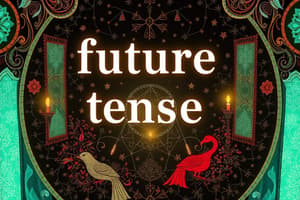Podcast
Questions and Answers
Jo has won the lottery. He says he's ______ to buy a Porsche.
Jo has won the lottery. He says he's ______ to buy a Porsche.
going
We're not ______ to paint our bedroom tomorrow.
We're not ______ to paint our bedroom tomorrow.
going
The sky is very black. It's ______ to snow.
The sky is very black. It's ______ to snow.
going
I crashed the company car. My boss isn't ______ to be very happy.
I crashed the company car. My boss isn't ______ to be very happy.
Will I do this for you? (Offer) Will you take it to Mrs. Jones? (Request) Stop taking or I will ______ you.
Will I do this for you? (Offer) Will you take it to Mrs. Jones? (Request) Stop taking or I will ______ you.
She will be ten ______ year.
She will be ten ______ year.
Future simple Will Usage 1- Prediction based on what we think or imagine.a) With verbs such as: ______ , hope , believe , expect , imagine , etc.
Future simple Will Usage 1- Prediction based on what we think or imagine.a) With verbs such as: ______ , hope , believe , expect , imagine , etc.
Future simple Will Usage 1- Prediction based on what we think or imagine.b) With expressions such as : I'm______ , I'm afraid , I'm certain etc.
Future simple Will Usage 1- Prediction based on what we think or imagine.b) With expressions such as : I'm______ , I'm afraid , I'm certain etc.
Future simple Will Usage 1- Prediction based on what we think or imagine.c) With adverbs such as : ______ , perhaps , certainly ,etc.
Future simple Will Usage 1- Prediction based on what we think or imagine.c) With adverbs such as : ______ , perhaps , certainly ,etc.
Future ( Be + going to.....) Going to is not a tense.It is a special structure that we use to talk about the ______.
Future ( Be + going to.....) Going to is not a tense.It is a special structure that we use to talk about the ______.
We often use going to to make a ______ about the future.
We often use going to to make a ______ about the future.
We use going to when we have the ______ to do something before we speak.
We use going to when we have the ______ to do something before we speak.
Flashcards are hidden until you start studying
Study Notes
Future Simple (Will) Usage
-
Used for predictions based on what we think or imagine, with verbs such as: think, hope, believe, expect, imagine, etc.
-
Used with expressions such as: I'm sure, I'm afraid, I'm certain, etc.
-
Used with adverbs such as: probably, perhaps, certainly, etc.
-
Example: He will pass the exam.
-
Used for promises, usually with verbs such as: promise, swear, guarantee.
-
Example: I promise I will not tell your secrets.
-
Used for quick decisions.
-
Example: The phone is ringing. I will answer.
-
Used for future facts, such as age or school year.
-
Example: She will be ten next year.
-
Used for offers, requests, and threats.
-
Examples: Will I do this for you? (Offer), Will you take it to Mrs. Jones? (Request), Stop taking or I will punish you. (Threat)
Future (Be + Going to...)
-
Going to is a special structure used to talk about the future.
-
Form: subject + be + going + to + infinitive.
-
Key words: Tomorrow, Soon, Tonight, Next + time (next week, month, year, etc.), any future date or event.
-
Used when we have the intention to do something before we speak, and we have already made a decision before speaking.
-
Example: Jo has won the lottery. He says he's going to buy a Porsche.
-
Used to make a prediction about the future based on present evidence.
-
Examples: The sky is very black. It's going to snow., I crashed the company car. My boss isn't going to be very happy.
Studying That Suits You
Use AI to generate personalized quizzes and flashcards to suit your learning preferences.




